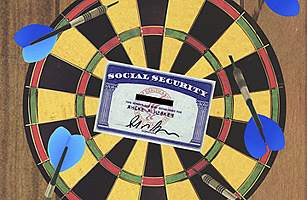
Columnists are paid to have opinions. Sometimes those opinions are wrong. Those two sentences are as obvious as a sunrise, but usually unspoken by my fellow opinionmongers. I can point you to many weeks of prescience and sheer genius in my work since I arrived at TIME in January 2003. But I think we'd learn more if we took a look at one of my goofs: I supported George W. Bush's idea of partially privatizing Social Security, which he tried to enact after he was re-elected in 2004. This was a close call for me at the time; it seems positively idiotic now that we've experienced the Great Recession — and the idea of private investment has finally regained proper perspective. Investment is about risk; Social Security is about certainty. A fair amount of certainty is crucial when it comes to retirement. Why, you might ask, was I blind to this simple proposition at the time?
Well, two reasons. The first was a matter of courtesy and optimism: I always try to give a newly elected President the benefit of the doubt. This is especially difficult — and all the more necessary — when it's a re-elected President whose policies seem misguided. I had written column after column about the bloody futility of Bush's war in Iraq — and don't get me started about the demonstrably foolish supply-side philosophy that spawned his tax cuts. Still, he was going to be my President for the next four years; my fellow citizens, and many of my readers, had voted him in. The partial privatization of Social Security was, he said, the top domestic priority for his second term. This seemed bold and politically risky. Scaring the elderly about cuts in their retirement benefits is one of the oldest tricks in the book, but Bush truly believed that if people could invest retirement savings in the market, they would end up with larger pensions.
And so did I, albeit with a truckload of caveats. I came to this belief the hard way, by overreading 30 years of experience as a journalist. Much of that time had been spent on urban issues, especially the failure of traditional liberal social programs to alleviate poverty. Indeed, welfare — Aid to Families with Dependent Children — as it was then constituted seemed a system of perverse rewards that intensified poverty, encouraging poor women not to marry, not to work, not to make sure their kids showed up at school and so forth. Their children were making and having babies prematurely, with no sense of responsibility. A discrete culture of poverty — in which people didn't look for work even when the economy surged — had taken hold. An essential feature of this culture, it seemed to me, was passivity.
One possible answer to the problem of passivity was choice: if parents were given the choice of which school their child could attend, for example, they might bestir themselves to take a more active role in their kids' education. I first saw this principle at work in East Harlem in the early 1980s, where parents were offered an array of schools with different curriculums for their children. The results were mixed, but it was lovely to see beaten-down people taking action, taking control of at least one public aspect of their lives for the first time.
I became besotted with the notion of choice, which was another way of saying I became besotted with the idea of markets. If you gave people a choice, the best public products — schools, job-training programs, health care services and, yes, retirement plans — would rise to the top, and average folks would be empowered to become more active, and therefore better, citizens. I still think it's a pretty good principle.
But there are limits. Social-service markets have to be strictly regulated. Even in Chile's groundbreaking social-security privatization plan, which I looked at on a visit, individuals were only allowed to invest their retirement savings in a handful of very cautious government-approved plans. There was never any talk of that kind of regulation in Bush's scheme, which was one of my caveats. I missed the biggest problem of all, though, because — like most Americans — I was raised in good times. Markets could tank. Retirement savings could be wiped out. The function of Social Security was — like food stamps — to provide a floor. It needed to be recession-proof.
And so, belatedly, I've realized that there are two types of social programs: those that are designed to raise people out of poverty ... and those, like Social Security, that provide, yes, a safety net when the bottom falls out. The programs that seek to raise the poor often work better when people are given a choice; those that provide a net need to be as simple and reliable as possible. In this case, the name said it all: Social ... Security. It was an essential lesson in the continuing education of a political columnist.